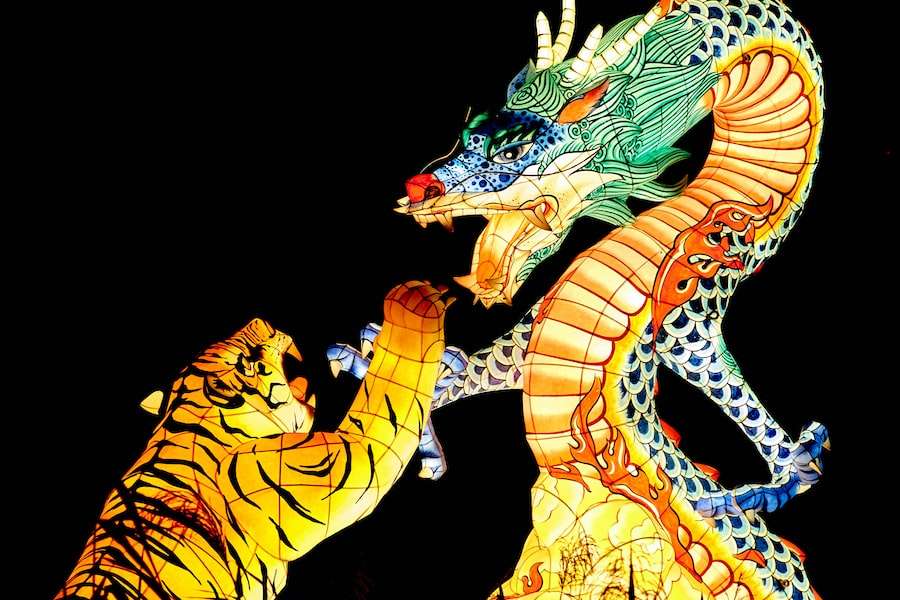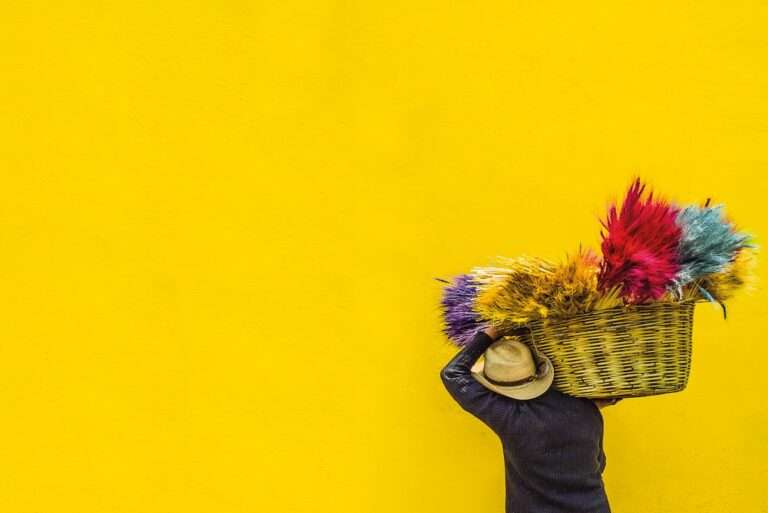The Mythical Symbolism of Dragon Tattoos

Dragons have long been a popular tattoo design, admired for their intricate details and powerful symbolism. These mythical creatures have a rich history in various mythologies and cultures around the world, making them a fascinating subject for body art. In this article, we will explore the significance of dragon tattoos and delve into the different meanings they can hold.
The Dragon as a Symbol of Power and Strength in Mythology
Dragons are often depicted as fearsome creatures with immense power and strength in mythology. They are known for their ability to breathe fire, fly, and possess incredible physical prowess. In many cultures, dragons are seen as guardians of treasure or powerful forces of nature.
In Norse mythology, the dragon Fafnir is a symbol of greed and power. He guards a hoard of gold and is eventually slain by the hero Sigurd. In Chinese mythology, dragons are revered as symbols of imperial power and strength. They are associated with the emperor and believed to bring good luck and prosperity.
The History of Dragon Tattoos and their Cultural Significance
The origins of dragon tattoos can be traced back to ancient times. In many cultures, dragons were seen as protectors or bringers of good fortune, making them popular subjects for tattoos. In Celtic culture, dragons were associated with wisdom and protection. They were often depicted in intricate knotwork designs, symbolizing the interconnectedness of all things.
In Japanese culture, dragons are seen as water deities and are believed to bring rain and fertility to the land. Dragon tattoos in Japan often depict these creatures in vibrant colors and intricate designs. In Chinese culture, dragons are seen as symbols of power, strength, and good luck. Dragon tattoos in China are often large-scale pieces that cover a significant portion of the body.
The Different Types of Dragon Tattoos and their Meanings
There are various types of dragon tattoos, each with its own unique meaning and symbolism. Traditional dragon tattoos often depict dragons in a more Western style, with wings and a serpentine body. These tattoos are often associated with power, strength, and protection.
Tribal dragon tattoos draw inspiration from indigenous cultures around the world. They often feature bold, black lines and geometric patterns. These tattoos can symbolize strength, courage, and a connection to one’s heritage.
Japanese dragon tattoos are known for their vibrant colors and intricate details. They often depict dragons in a more serpentine form, with long bodies and multiple legs. These tattoos symbolize power, wisdom, and good fortune.
Chinese dragon tattoos are often large-scale pieces that cover a significant portion of the body. They are associated with power, strength, and good luck. These tattoos can also symbolize protection and prosperity.
Celtic dragon tattoos are characterized by intricate knotwork designs. They symbolize wisdom, protection, and the interconnectedness of all things.
The Dragon as a Symbol of Protection and Good Fortune
Dragons have long been associated with protection and good fortune in many cultures. In Chinese culture, dragons are believed to bring luck and prosperity. Dragon tattoos with this symbolism often feature vibrant colors and intricate designs.
In Japanese culture, dragons are seen as water deities that bring rain and fertility to the land. They are believed to protect against evil spirits and bring good fortune to those who possess their image as a tattoo.
The Dragon as a Symbol of Transformation and Rebirth

Dragons are often associated with transformation and rebirth in mythology. In many cultures, they are seen as creatures that can shed their old skin or transform into different forms.
In Chinese mythology, dragons are believed to have the ability to transform into humans or other animals. This transformation represents the cycle of life and the idea of rebirth.
Dragon tattoos with this symbolism often depict dragons in the midst of transformation or surrounded by symbols of rebirth, such as flowers or butterflies.
The Dragon in Eastern vs Western Mythology: How it Affects Tattoo Symbolism
The symbolism of dragon tattoos can vary depending on whether they are inspired by Eastern or Western mythology. In Western mythology, dragons are often seen as fearsome creatures that must be slain by heroes. They are associated with chaos and destruction.
In Eastern mythology, dragons are revered as powerful beings that bring good luck and prosperity. They are associated with the emperor and symbolize power, strength, and wisdom.
The Dragon as a Symbol of Masculinity and Femininity
Dragons are often seen as symbols of both masculinity and femininity. In many cultures, they are believed to possess both male and female qualities.
In Chinese culture, dragons are often depicted with both masculine and feminine characteristics. They are seen as symbols of balance and harmony between the two genders.
Dragon tattoos with this symbolism often depict dragons in a more androgynous form, with features that represent both masculinity and femininity.
The Dragon as a Symbol of Wisdom and Knowledge
Dragons have long been associated with wisdom and knowledge in many cultures. In Chinese culture, dragons are believed to possess great wisdom and are associated with the element of water.
In Celtic culture, dragons are seen as symbols of wisdom and protection. They are often depicted in intricate knotwork designs, symbolizing the interconnectedness of all things.
Dragon tattoos with this symbolism often feature images of dragons surrounded by symbols of knowledge, such as books or scrolls.
The Dragon as a Symbol of Creativity and Imagination
Dragons are often associated with creativity and imagination in many cultures. They are seen as creatures that exist beyond the realm of reality, representing the limitless possibilities of the human mind.
In Japanese culture, dragons are believed to possess great creative power. They are associated with the arts and inspire artists and poets.
Dragon tattoos with this symbolism often feature vibrant colors and intricate designs, representing the boundless creativity of the human spirit.
The Dragon as a Symbol of Balance and Harmony in Life
Dragons are often seen as symbols of balance and harmony in many cultures. They are believed to possess both destructive and creative powers, representing the delicate balance between chaos and order.
In Chinese culture, dragons are associated with the concept of yin and yang, representing the balance between masculine and feminine energies.
Dragon tattoos with this symbolism often feature images of dragons surrounded by symbols of balance and harmony, such as the yin and yang symbol.
In conclusion, dragon tattoos have a rich history and powerful symbolism in mythology and culture. They represent power, strength, protection, good fortune, transformation, rebirth, wisdom, knowledge, creativity, balance, and harmony. Whether inspired by Eastern or Western mythology, dragon tattoos continue to be popular today due to their intricate designs and the deep meanings they hold.
If you’re fascinated by the symbolism behind tattoos, you might be interested in exploring the meaning of dragon tattoos. Dragons have long been associated with power, strength, and wisdom in various cultures. They are often seen as protectors and bringers of good fortune. To delve deeper into the symbolism of dragon tattoos, check out this insightful article on Symbolism Hub: The Symbolism of a Snake. Discover the hidden meanings behind these mythical creatures and gain a deeper understanding of the significance they hold in tattoo art.
FAQs
What is the meaning of a dragon tattoo?
A dragon tattoo can have various meanings depending on the culture and context. In general, it symbolizes power, strength, wisdom, and good luck.
What does a dragon tattoo represent in Chinese culture?
In Chinese culture, a dragon tattoo represents prosperity, good fortune, and imperial power. It is also associated with the elements of water and air, and the yin-yang balance.
What does a dragon tattoo represent in Japanese culture?
In Japanese culture, a dragon tattoo represents strength, courage, and protection. It is also associated with the natural elements of water, earth, and sky, and the Buddhist concept of enlightenment.
What are the different types of dragon tattoos?
There are various types of dragon tattoos, including Chinese dragons, Japanese dragons, Celtic dragons, tribal dragons, and Western dragons. Each type has its own unique characteristics and symbolism.
What are some popular dragon tattoo designs?
Some popular dragon tattoo designs include a dragon wrapped around a sword or a tree, a dragon breathing fire, a dragon with its wings spread, a dragon with a pearl or a crystal ball, and a dragon with a yin-yang symbol.
What are some tips for getting a dragon tattoo?
Some tips for getting a dragon tattoo include researching the different types and designs of dragon tattoos, finding a reputable tattoo artist who specializes in dragon tattoos, discussing the size and placement of the tattoo with the artist, and taking good care of the tattoo after it is done.





